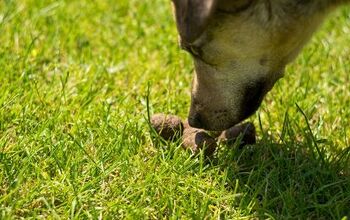Just As Gross As Is Sounds: The Low-Down On Roundworms In Dogs

While understandably high on the “yuck” meter for pet owners, worms are one of the most common ailments experienced by dogs and are often one of the most easily treated. Found in even the best kennels, roundworms are an intestinal parasite that is contracted by ingesting the roundworm eggs found in animal feces or in similarly contaminated soil. The parasite is considered “zoonotic” meaning it can in fact be passed to humans and certainly reinforces the importance of diligence in hand washing following outdoor activities.
What Causes Roundworms in Dogs?
Roundworms, or ascarids, are parasites that thrive inside your pet’s intestinal tract. While not uncommon in adult dogs, puppies run the highest risk of becoming sick as the parasite can be transferred from an infected mother either prior to birth or through her milk.
Related: 5 Reasons Why You Should Always Pick Up Dog Poop
For adult animals it can be contracted by eating the roundworm eggs – found in animal feces or small infected rodents – which then hatch and turn into larvae. The larvae then spread to your pet’s liver and up to his windpipe, where they are coughed up, swallowed and move back down into the intestine. Once settled, they grow into adult worms, lay eggs which present in your pet’s feces and the cycle continues.
Symptoms & Diagnosis of Roundworms in Dogs
Not all dogs exhibit symptoms however pet parents should be on the watch for bloating, diarrhea, vomiting, dull coat, loss of appetite or weakness. And of course the clincher is finding the actual roundworms – typically a couple inches long and resembling spaghetti – in Rover’s feces or vomit!
Related: A Short Guide To Common Parasites In Cats
If any of these symptoms or obvious signs present, it’s time to bring your pet to the vet where tests, a proper diagnosis and treatments can begin. Left untreated, roundworms can cause serious infections in dogs and puppies as they live off the food consumed by the host.
To confirm it is in fact roundworms, a stool sample will be taken and a test called fecal flotation conducted. Through this, the eggs can be detected under a microscope with the actual species being determined and a treatment plan put in place.
Treatment Options
Once diagnosed there are a variety of safe, effective de-worming medications on the market and your vet can guide you to the best option for your dog.
Taken orally, the initial dose kills the adult worms with subsequent doses – typically in two week intervals – killing the new worms as the larvae mature. How many visits or treatments are required will depend on the age of your pet and the severity of the situation. Because the life cycle of roundworms is four weeks from larvae to adult, it cannot be formally diagnosed in young pups and as a result many vets will automatically deworm at two to three week s of age as a preventative measure.
For pet parents not using a monthly medication designed for parasite control, your vet may recommend a regular deworming to keep on top of roundworms in dogs. For puppies, that would be two to four times a year, and for dogs older than one year, its one to two times a year.
Mary Simpson is a writer and communications professional from Port Credit, Ontario. A soft touch for anything stray, she shares her century home with an eclectic collection of rescues that include orange tabby Chico, tuxedo Simon, and jet black Owen. She enjoys running, politics, exploring the wine regions of Niagara and is an avid supporter of the “shop local” movement.

Sharing space with three seriously judgy Schnoodles and a feline who prefers to be left alone. #LivingMyBestLife
More by Mary Simpson
























